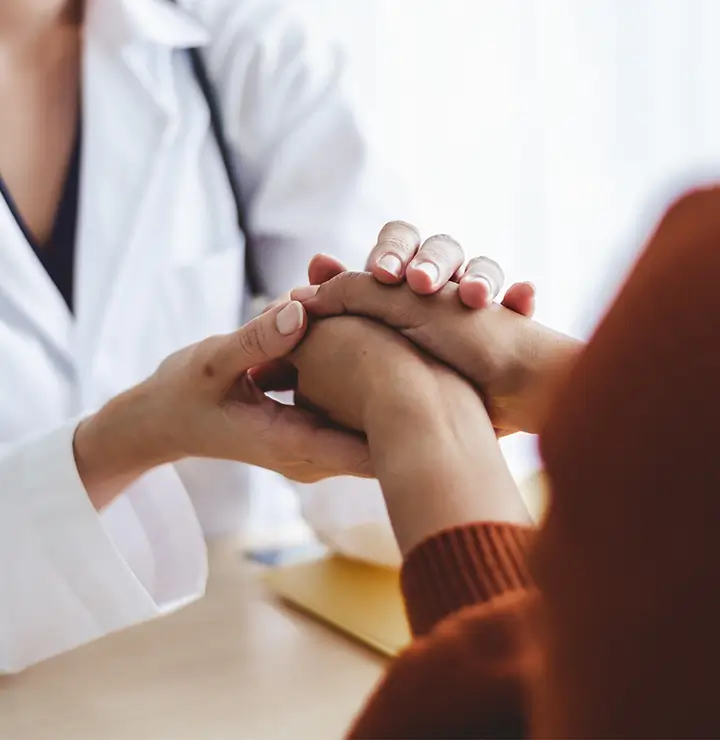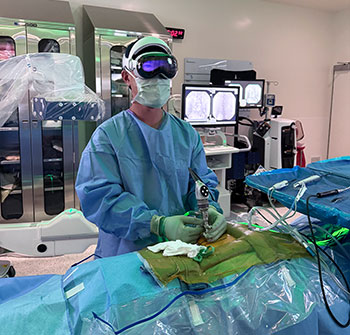
Stroke Care
Though strokes are more common than we’d prefer, the brain can relearn anything. Our comprehensive stroke program is a true leader in advanced treatment.
Contemporary yet rapid treatment and your own sustained efforts will help you recover from a stroke.
Get better with excellent care and support from our multidisciplinary stroke team at UCI Health.
Our approach to stroke care
When a stroke happens, every minute counts. The faster you’re diagnosed and treated for a stroke, the better your chances of a full recovery. Our approach to care is to keep you at the center of our practice and to deliver thorough treatment as quickly as possible.
We have hired only fellowship-trained, board certified stroke neurologists for the UCI Health Comprehensive Stroke & Cerebrovascular Center. Our specialists treat both ischemic and hemorrhagic strokes, providing 24/7, 365 day-a-year service. You can always reach one of us with any questions.
The team that will help you recover
When you are at an academic medical center like ours, you benefit from a large, robust infrastructure. This gives you nearly instant access to virtually any specialist or therapist who can propel your recovery forward.
Your brain is the command center for most of your daily activities. After a stroke, we’ll get you coordinated access to multi-subspecialty clinicians and therapists. They’ll help you recover from stroke and reclaim the joy of everyday achievements.
The subspecialists that will provide comprehensive care and help you recuperate include:
- board certified stroke neurologists
- Neuro radiologists
- Neuro interventionists
- Neurosurgeons
- Neuro intensivists
- Vascular surgeons
- Nurses
- Therapists
Why choose UCI Health for stroke care?
We are Orange County's first Joint Commission-certified comprehensive stroke center
The UCI Health Comprehensive Stroke & Cerebrovascular Center sets the highest standards for providing rapid, quality treatment for patients with acute stroke and complex cerebrovascular diseases, 24 hours a day, seven days a week. We are ranked as one of the top 100 hospitals nation-wide for stroke care by Healthgrades and are the recipient of the American Heart Association’s Gold Health Plus Achievement Awards for the recent 8 consecutive years. We have also received the Healthgrades Awards for excellence in stroke care, neuroscience and cranial neurosurgery.
Don’t underestimate the importance of integrated and multidisciplinary care to your recovery
Multidisciplinary care is a unique feature here at UCI Health. It creates a seamless patient experience instead of scattered or uncoordinated treatment. While this team approach can support any illness, it’s crucial for the therapeutic and rehab needs of stroke patients.
Our Neuroscience ICU is a 12-bed, highly specialized unit for critically ill stroke patients
If you have a severe stroke, you’ll get state-of-the-art intensive neurological, medical and surgical management in our Neuro-ICU. It’s fully staffed by our board certified neurointensivists who are proficient in both neurological and medical intensive care.
Our clinical trials push medicine forward for everyone
As an academic center, our research and clinical trials keep us on the leading edge of medical practice. Our scientists and doctors collaborate to identify experimental medicines and tools that transform care for the better. If you qualify for a clinical trial, you may get access to medicines not widely available anywhere else.
Looking for more options?
View all clinicians
If you have stroke symptoms, you must take rapid action and call 911
We have a national certification as a Comprehensive Stroke Center. This lets emergency responders know that UCI Health is best equipped to treat you in those first critical minutes and hours.
Call 866-STROKE-3 (866-787-6533) for an appointment with a stroke specialist.

Find a neurology clinical trial
Talk to your doctor to see if a neurology clinical trial is right for you.
Featured Blog Posts

Soothing, satisfying soups for cozy winter days

Sweet and healthy holiday treats

Fighting the growing diabetes epidemic among women
Featured News Stories

Future of spine surgery is bright

Working with patients who consult search engines first

UCI Health Comprehensive Spine Center recognized for national leadership in treatment, research, education
Upcoming Events
3-4 p.m. +7 more dates




